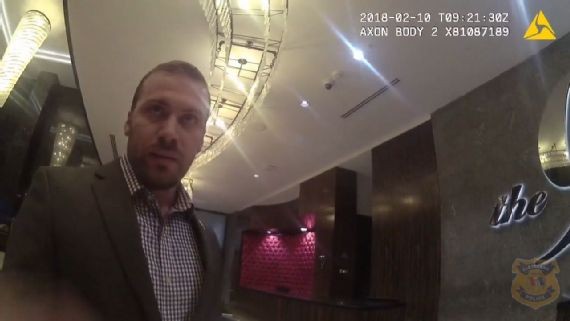The 9 Defends Actions of Staff on Night of Kareem Hunt Assault, Which Allegedly Included Refusing to Let Victim Use Phone to Call Police
Every day since TMZ published the now infamous security footage, it seems, there emerges new and troubling questions about how just about everyone involved in the Kareem Hunt incident at The 9 in February of this year conducted themselves. While there are many moving parts and few answers so far, the common through line is readily apparent: layers of power that acted in concert to protect a wealthy and famous athlete that, by definition and practice of that protection, in turn subverted the legitimate claims of abuse from a woman.
And it worked, which is the sad and predictable part of the whole thing. Were it not for TMZ, none of this would be known. We'd know, through common sense and general understanding of the world, that shit like this happens, that women are ignored, that cops overstep their boundaries, that cops neglect to do actual police work sometimes, that posh hotels with security teams keep things from public view. But this specific incident, now almost a year old, would have been buried. Hunt would still be playing on Sundays. The Cleveland police department would not be facing specific questions about its handling of the investigation, and nor would the NFL.
Instead, the many moving parts that coalesced that evening to shield Kareem Hunt are being laid bare in articles and TV coverage across the country in all their slimy and at times illegal shame.
Start with The 9, the swanky, high-end apartment and condo complex that caters to and prides itself on the patronage of celebrities and athletes. That it had and continues to have no interest in upsetting its high-profile clientele is not surprising: protecting and nurturing those relationships is quite literally its business model.
According to the victim, who was 19 at the time of the assault and who was partying with Hunt at the 21-and-over club Magnolia in the Flats earlier in the evening, staff in the lobby refused to let her use a hotel phone to call 911 to report the crime and summon police.
And according to Derek Szeto, a man who was staying at the hotel and who did let the victim use his cell phone to call 911, hotel security directed Cleveland police to confiscate his cell phone to delete video he had been recording of the staff's interaction with police and witnesses. The "loss prevention officer" on duty that night for The 9 told officers he'd been recorded without his permission, which is a bullshit claim about video captured in a public space.
And the officers, for some reason, obliged, wrongly informing him he'd been "illegally videotaping someone" and arresting Szeto in the process for drunk and disorderly conduct.
"We don't need a warrant, because you just committed a crime," an officer falsely told him. (Meanwhile, hotel staff informed police they'd have to first check with "the owner" before allowing them to knock on Hunt's door and interview him. And police, once they did speak to Hunt, asked if he wanted them to turn off their body cameras, to which he said yes and to which they acquiesced.)
Szeto was sober, he's said in media interviews, and though he wanted badly to fight the citation, he paid the fine. His phone was returned and the video was not deleted.
The problems here are numerous. As the ACLU and others have noted since that news was reported, “The right of individuals to record the police is a critical check and balance. It’s highly concerning that an individual’s phone would be confiscated, or a person arrested, simply because they were in the vicinity of an alleged crime and may have been recording the incident on their phone. Today the information contained on a person’s cellphone is of a highly personal nature. Looking through a person’s phone is likely just as intimate as exploring their home.”
That check and balance is exactly what Szeto was trying to provide. "Tyler [Krajcik], the security guard on staff, seemed callous and insensitive at first. I felt like we were being blamed for the situation," Szeto wrote in a report he filed with Geis that was obtained by ESPN. "However, he returned five minutes later and said, 'I just looked at the security footage and, wow, are you OK?' to Abby."
"The hotel was acting weird, and I wanted video evidence of this for my safety," he told ESPN.
The 9 issued a defiant statement this week defending any and all actions taken by its staff, which allegedly refused to let the victim use a phone and later directed police to confiscate a cell phone video, that evening.
“The actions of our team members throughout this and any evening emulated and exceeded our standards of putting safety and security first,” Geis Hospitality Group COO and VP of Finance Tony Quintal said. “Any allegation suggesting otherwise is either false or a skewed recapitulation of what transpired.”
It's hard to argue The 9 doesn't have standards. Who they apply to is an open question though.


